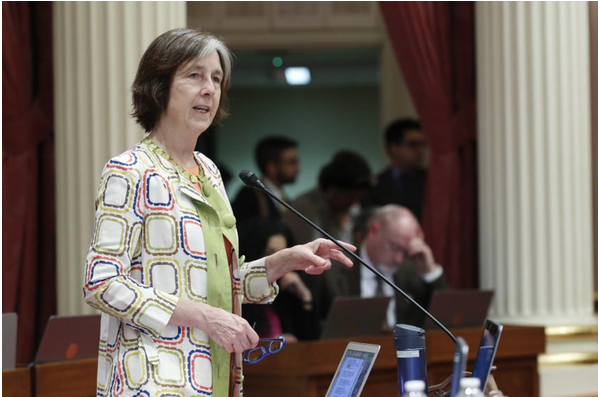CommentsTALKBACK--Unfortunately, this op-ed published on CityWatchLA.com is riddled with false claims about SB 330 by state Sen. Nancy Skinner, D-Berkeley. (Senator Skinner: Photo above.)
Here is a rundown of nine of them:
False claim #1: “Senate Bill 330 would create parcel-by-parcel spot-zoning and up-zoning for the benefit of private developers. This provision negates a city’s power to adopt a carefully prepared General Plan that lowers density in specific areas, even if it increases overall planned population and housing density. Such a prohibited General Plan could also provide for future housing needs on transit and commercial corridors, with careful consideration for supporting public services and infrastructure.”
Fact: SB 330 allows cities and counties to downzone specific areas as long as they upzone elsewhere so that there is no net loss in housing capacity.
Here is the exact language:
“(h) This section does not prohibit an affected county or an affected city from changing a land use designation or zoning ordinance to a less intensive use if the city or county concurrently changes the development standards, policies, and conditions applicable to other parcels within the jurisdiction to ensure that there is no net loss in residential capacity.”
False claim # 2: “In Los Angeles this imposed State law could invalidate many new planning-related ordinances” including “The Affordable Housing Linkage Fee.”
Fact: On May 16, the Senate Appropriations Committee amended SB 330 so that it no longer impacts housing fee ordinances, including The Affordable Housing Linkage Fee.
False claim #3: SB 330 would “invalidate” the South and Southeast Los Angeles Community Plan Implementation Ordinances.
Fact: SB 330 does not limit green prints or urban growth boundaries (pg. 45, line 37)
False claim #4: SB 330 invalidates “The Home Sharing Ordinance.”
Fact: SB 330 explicitly allows ordinances that regulate short-term rentals (pg. 44, line 18-23)
False claim #5: SB 330 invalidates “The Permanent Supportive Housing Ordinance.”
Fact: This ordinance is in line with SB330 and creates more housing, so it would not be pre-empted.
False claim #6: SB 330 invalidates “The Small Lot Subdivision Code Amendment and Policy Standard.”
Fact: SB 330 only requires that design standards be “objective.” So, it would not pre-empt this ordinance (pg. 43, line 29-30)
False claim #7: SB 330 invalidates “The Value Capture Ordinance.”
Fact: SB 330 does not prevent locals from offering higher density in exchange for more low-income housing (pg. 45, line 11)
False claim #8: “SB 330 would allow private developers to build whatever they wanted, wherever they wanted, independent of local General Plans, zones, and CEQA-based environmental reviews.”
Fact: SB 330, on p. 45, line 22-30, only removes requirements that a city council or county board of supervisors get voter approval before upzoning or increasing density. Also, multiple references in the bill state that nothing pre-empts CEQA (p. 45, line 14-15 and pg. 46, line 1-4 for example). Nothing in the bill changes CEQA EIR timelines. Local governments still have to approve and deny projects under the bill, according to their general plan and zoning rules, they just can’t downzone unless they upzone elsewhere, and they cannot prohibit or unfairly limit housing projects from coming forward for consideration.
False claim #9: “Senate Bill 330 shields slumlords and absentee owners from enforcement actions for code violations and nuisance abatement laws for seven years, even for fire, sanitation, and seismic safety laws.”
Fact: SB 330 creates a process whereby code enforcement officers can establish a 7-year timeframe for buildings that are not compliant with building codes to come fully up to code so as to reduce the displacement of people from their homes, but it allows code enforcement officers to require health and life safety improvements first.
I posted the above list as a comment at the end of the story. But I also thought you should be aware of the numerous falsehoods in the piece.
(Robert Gammon is Communications Director and Policy Adviser for State Senator Nancy Skinner.)
-cw
















